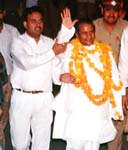Commentary /Vir Sanghvi
Frontier justice has no place in the political mainstream
 When you ask people how they
can justify jailing citizens who are - in the eyes of the law at least - innocent of any crime,
the justification offered is remarkably similar to the justification
for encounter deaths.
When you ask people how they
can justify jailing citizens who are - in the eyes of the law at least - innocent of any crime,
the justification offered is remarkably similar to the justification
for encounter deaths.
The judicial system is slow. The cases will take years to come
to trial. The politicians will appeal and will drag out the cases
for even longer. Hard evidence may be difficult to come by. And
at the end of the day, some of them may die before sentence is
passed on them.
Far better therefore, to send them all to jail now. It may well
be against the principle of natural justice but at least it makes
sure that they get some kind of punishment. It sends out a signal
that the corrupt will not get away with it and other politicians
will heed their example.
I don't want to get into the case for and against encounter deaths.
But the parallels between the two justifications must be obvious.
Both are about frontier justice: So what if the principles of
the law are suspended? At least some people get punished and are
made an example of.
But there is one important difference. In the case of encounter
deaths, the state of the courts is only one part of the argument.
There is also the danger that terrorists or mafia dons would eliminate
witnesses.
No such argument applies in this case. The only justification
for frontier justice here is the state of the courts.
When L K Advani was chargesheeted in the hawala case, he declared
that he wanted hearings to commence immediately and hoped that
the verdict would be delivered before the June election. He was
being optimistic -- charges have only just been framed and it
will be years before the case is settled. And this, in a matter
where there is a special judge and a separate court.
Because the courts are overloaded, because there are not enough
judges and because Indians are litigious people, the judicialsystem functions so slowly that justice is often not seen to be
done. Hence, the middle class despair with the system and the temptation
to search for an encounter-type solution.
The judges have now won middle class cheers by sending people
to jail and demonstrating that the system still has teeth. It
is reassuring to know that a magistrate can move against any
citizen no matter how important he is. But there are dangers inherent
in this phenomenon.
The fact that a judge can imprison a man does not mean that a
system works or that justice is being done. It was during Chief
Justice P N Bhagwati's tenure that the Supreme Court recognised
that thousands of people were being held in jail without trial.
Justice Bhagwati tried to reduce the number, repeating again and again
that anybody who has not been convicted is innocent.
I am not sure if Bhagwati's dictum is still remembered. All too
often, we seem to confuse charge-sheets with convictions.
Nor do I think that frontier justice has any place in the political
mainstream. It may just possibly make sense on the terrorist frontier
but it has the potential to destroy the foundations of our entire
judicial system.
Alas, we are too busy cheering to recognise this. And we forget to
ask the obvious question.
If the justification for frontier justice is the state of the
courts, then surely, the immediate priority is to reform the
courts, not to earn populist cheers. And yet, while the judiciary
has told us what is wrong with Parliament, the CBI, the petroleum
ministry, the police force and nearly everything else, it has
yet to turn its searching gaze on itself.
Surely, the way to fight corruption is not to jail people without
trial. The way to do it is to reform the courts so that trials
can take place speedily and the corrupt can be sent to jail after
being convicted.
Forget this principle in your glee at seeing Sukh Ram or Narasimha
Rao in Tihar and you risk destroying the liberal society.
|





 When you ask people how they
can justify jailing citizens who are - in the eyes of the law at least - innocent of any crime,
the justification offered is remarkably similar to the justification
for encounter deaths.
When you ask people how they
can justify jailing citizens who are - in the eyes of the law at least - innocent of any crime,
the justification offered is remarkably similar to the justification
for encounter deaths.